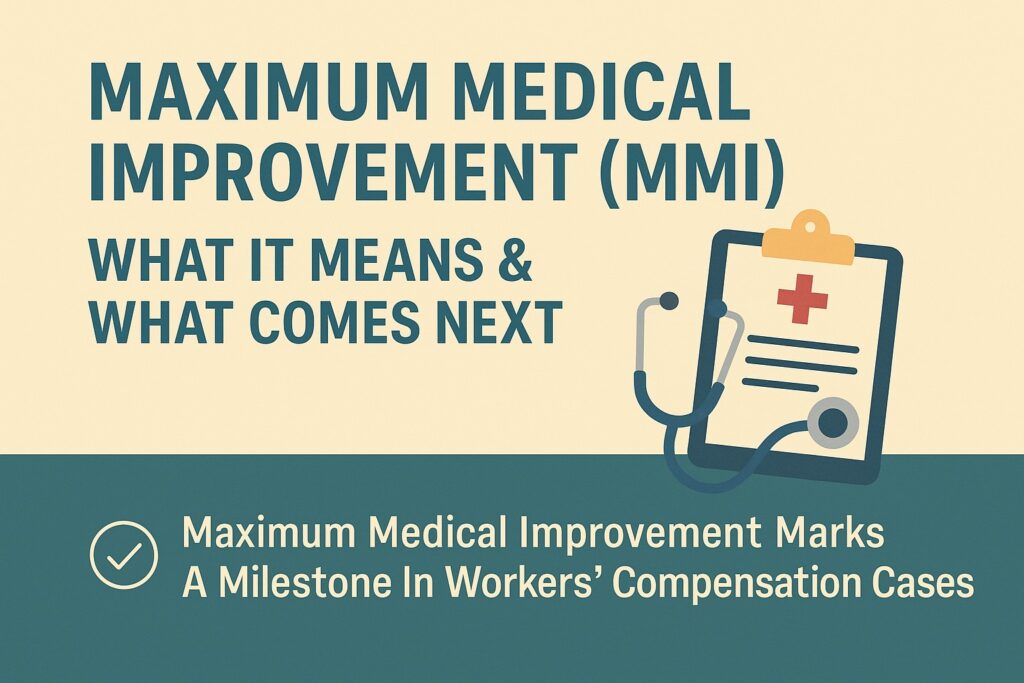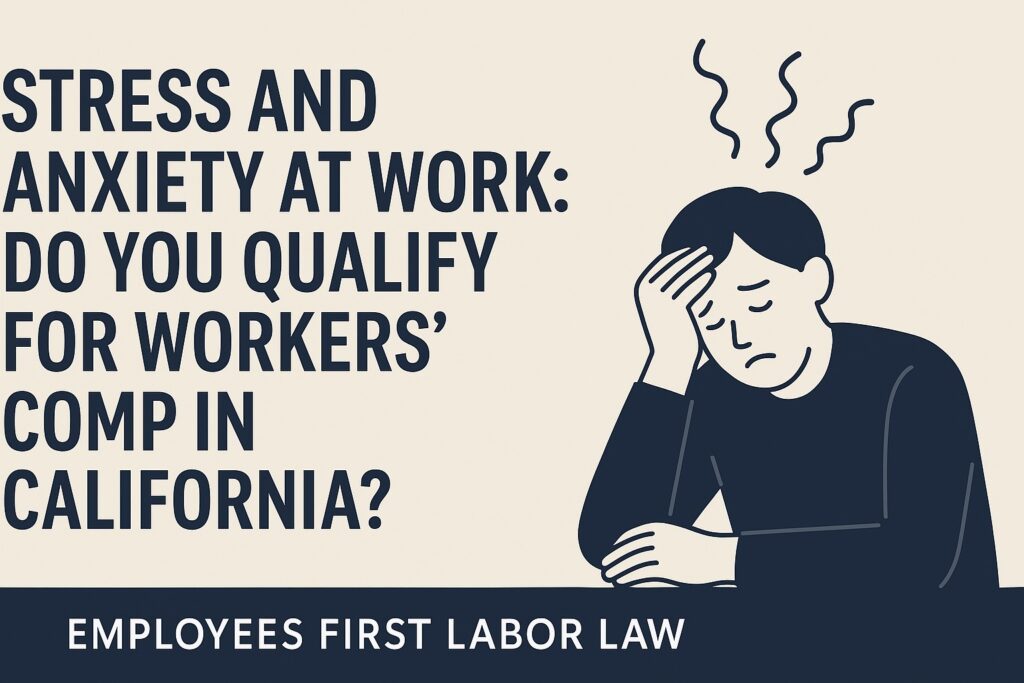
If you’ve filed a workers’ compensation claim in California, one of the most important stages in your case is reaching Maximum Medical Improvement (MMI). But what exactly does that mean — and how does it affect your benefits or settlement?
This guide explains what happens when you reach MMI, what your rights are, and how to protect yourself from being shortchanged during this critical phase.
What Is Maximum Medical Improvement (MMI)?
MMI means your work-related injury or illness has reached a point where it’s not expected to improve significantly with further medical treatment.
This doesn’t mean you’re fully recovered — it just means your condition has stabilized. You may still have pain, limited mobility, or a permanent disability. But your doctor believes that additional treatment is unlikely to make a meaningful difference in your condition.
Under California workers’ compensation law, once you reach MMI:
- You stop receiving temporary disability benefits (TTD or TPD)
- Your doctor will issue a Permanent and Stationary (P&S) report
- The claims administrator begins evaluating your permanent disability (PD) rating
What’s in the Permanent and Stationary (P&S) Report?
Once you’re declared MMI, your Primary Treating Physician (PTP) completes a P&S Report, which includes:
- A description of your medical condition
- Work restrictions or limitations
- Whether you need future medical care
- A Whole Person Impairment (WPI) rating
- Your ability to return to work (with or without accommodations)
This report is crucial — it’s what the insurance company and the state use to determine your Permanent Disability (PD) rating, which affects how much compensation you’re owed.
Who Decides When You’ve Reached MMI?
Your MMI status is determined by a doctor — typically your:
- Primary Treating Physician (PTP)
- Qualified Medical Evaluator (QME)
- Agreed Medical Evaluator (AME) (if both sides agree on the doctor)
Once you’re deemed MMI, your doctor will issue a report outlining:
- Your permanent impairments
- Your work restrictions (if any)
- Whether additional treatment is necessary
- A proposed Permanent Disability Rating
How Is Your Permanent Disability Rating Calculated?
Your PD rating is based on:
- Your impairment percentage from the doctor’s report
- Your age and occupation
- Adjustments based on how the injury affects your ability to work
Once calculated, your PD rating is converted into a dollar amount using a formula set by the California Division of Workers’ Compensation (DWC).
💡 Example: A worker with a 15% permanent disability rating may receive compensation over a set number of weeks based on that rating and their weekly earnings at the time of injury.

Why Does MMI Matter?
Reaching MMI triggers several major developments in your workers’ comp case:
1. Temporary Disability Payments Stop
Your Temporary Total Disability (TTD) benefits typically end once you’re declared MMI — even if you still can’t return to work.
2. Permanent Disability Benefits Begin
Your doctor will assign an impairment rating that will be used to calculate your Permanent Disability (PD) benefits.
3. Settlement Negotiations Can Begin
Once MMI is reached and a permanent disability rating is assigned, you may be eligible for:
- A lump sum settlement
- A Structured Compromise & Release
- Ongoing PD payments and future medical care
What If You Disagree with the MMI Determination?
You are not locked into your doctor’s MMI report — and you should not accept a low rating without review. If you disagree with the findings, you can request a second opinion from a:
- Panel QME (Qualified Medical Evaluator) — selected through the DWC
- Agreed Medical Evaluator (AME) — if both sides consent
This is especially important if:
- Your doctor underreports your pain or limitations
- They prematurely declare you MMI before trying all treatment options
- They assign a low permanent disability rating
At EFLL, we routinely challenge biased or inaccurate MMI reports to ensure clients are not unfairly pushed into a settlement.
Can You Get Medical Treatment After MMI?
Yes. MMI does not mean you stop receiving care.
You are still entitled to:
- Medications
- Physical therapy
- Surgery (in some cases)
- Pain management
- Durable medical equipment (like braces, wheelchairs, etc.)
However, you’ll need a future medical award included in your settlement or findings, and the treatment must be approved under California’s utilization review process.
What Comes Next After MMI?
Here’s a simplified roadmap:
| Step | What Happens |
|---|---|
| 1. MMI Reached | Treating physician or evaluator issues report |
| 2. Impairment Rating Assigned | Your injury is rated using AMA Guides |
| 3. Permanent Disability Rating Calculated | Adjusted for age, occupation, etc. |
| 4. Settlement Discussions Begin | Option to settle or proceed to hearing |
| 5. Future Medical Care Determined | Lifetime care can be part of your award |
How EFLL Helps After MMI
At Employees First Labor Law, we know that reaching Maximum Medical Improvement (MMI) is a pivotal point in your case — and one where mistakes can cost you thousands. We step in to make sure your rights, benefits, and medical needs are fully protected.
1. We Challenge Inaccurate MMI Reports
If your treating doctor rushed to declare MMI or overlooked key injuries, we take action. We review the report for errors and, when needed, push for a second opinion through a Panel QME or Agreed Medical Evaluator (AME).
2. We Maximize Your Permanent Disability Rating
Your Permanent Disability (PD) rating drives the value of your case. We ensure all impairments are accounted for and combined correctly, so you receive the highest compensation possible.
3. We Negotiate Full-Value Settlements
Whether it’s a lump sum settlement or structured payout, we fight for agreements that include fair wage replacement and ongoing medical care — not just a quick resolution that benefits the insurer.
4. We Protect Your Future Medical Rights
MMI doesn’t end your need for care. We ensure your settlement or award includes access to surgeries, medications, rehab, and other future treatment, without surprise out-of-pocket costs.
If you’ve been declared MMI, let us make sure that doesn’t mean the insurance company gets the last word.
Get a Free Case Review Today
Have you been declared MMI? Don’t sign anything or accept a settlement without knowing what your case is really worth. Call us today for a free consultation.
📞 Click to Call
📩 Submit Your Case Here
We’ll review your MMI report and explain your options — at no cost.



